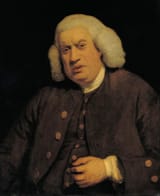Search Results
7/2/2025, 12:36:22 AM
>>24512737
>On Tuesday, July 18, I found tall Sir Thomas Robinson sitting with Johnson. Sir Thomas said, that the king of Prussia valued himself upon three things;—upon being a hero, a musician, and an authour. JOHNSON. 'Pretty well, Sir, for one man. As to his being an authour, I have not looked at his poetry; but his prose is poor stuff. He writes just as you might suppose Voltaire's footboy to do, who has been his amanuensis. He has such parts as the valet might have, and about as much of the colouring of the style as might be got by transcribing his works.' When I was at Ferney, I repeated this to Voltaire, in order to reconcile him somewhat to Johnson, whom he, in affecting the English mode of expression, had previously characterised as 'a superstitious dog;' but after hearing such a criticism on Frederick the Great, with whom he was then on bad terms, he exclaimed, 'An honest fellow!'
>On Tuesday, July 18, I found tall Sir Thomas Robinson sitting with Johnson. Sir Thomas said, that the king of Prussia valued himself upon three things;—upon being a hero, a musician, and an authour. JOHNSON. 'Pretty well, Sir, for one man. As to his being an authour, I have not looked at his poetry; but his prose is poor stuff. He writes just as you might suppose Voltaire's footboy to do, who has been his amanuensis. He has such parts as the valet might have, and about as much of the colouring of the style as might be got by transcribing his works.' When I was at Ferney, I repeated this to Voltaire, in order to reconcile him somewhat to Johnson, whom he, in affecting the English mode of expression, had previously characterised as 'a superstitious dog;' but after hearing such a criticism on Frederick the Great, with whom he was then on bad terms, he exclaimed, 'An honest fellow!'
7/1/2025, 11:23:27 PM
Our next meeting at the Mitre was on Saturday the 15th of February, when I presented to him my old and most intimate friend, the Reverend Mr. Temple, then of Cambridge. I having mentioned that I had passed some time with Rousseau in his wild retreat, and having quoted some remark made by Mr. Wilkes, with whom I had spent many pleasant hours in Italy, Johnson said (sarcastically,) 'It seems, Sir, you have kept very good company abroad, Rousseau and Wilkes!' Thinking it enough to defend one at a time, I said nothing as to my gay friend, but answered with a smile, 'My dear Sir, you don't call Rousseau bad company. Do you really think HIM a bad man?' JOHNSON. 'Sir, if you are talking jestingly of this, I don't talk with you. If you mean to be serious, I think him one of the worst of men; a rascal who ought to be hunted out of society, as he has been. Three or four nations have expelled him; and it is a shame that he is protected in this country.' BOSWELL. 'I don't deny, Sir, but that his novel may, perhaps, do harm; but I cannot think his intention was bad.' JOHNSON. 'Sir, that will not do. We cannot prove any man's intention to be bad. You may shoot a man through the head, and say you intended to miss him; but the Judge will order you to be hanged. An alleged want of intention, when evil is committed, will not be allowed in a court of justice. Rousseau, Sir, is a very bad man. I would sooner sign a sentence for his transportation, than that of any felon who has gone from the Old Bailey these many years. Yes, I should like to have him work in the plantations.' BOSWELL. 'Sir, do you think him as bad a man as Voltaire?' JOHNSON. 'Why, Sir, it is difficult to settle the proportion of iniquity between them.'
Page 1
